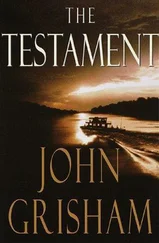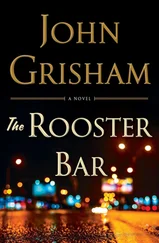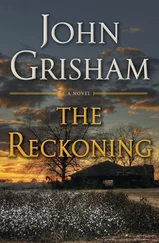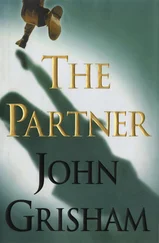“Maybe. Let’s discuss it later. For the next few weeks, he’ll be spooked because of my call. Good for him. He’ll make a mistake at some point and we’ll be there.”
“Where are you headed now?”
“Savannah. I’ll be there for a couple of days, then head to Florida.”
“Florida. Seabrook?”
“Yes, Seabrook. I’ve decided to take the case.”
Frankie’s face never reveals much. His eyes seldom blink, his voice is steady and flat as if he’s measuring every word. Survival in prison required a poker face. Long stretches of solitude were common. “Are you sure?” he asks. It’s obvious he has doubts about Seabrook.
“The guy is innocent, Frankie. And he has no lawyer.”
The platters arrive and we busy ourselves with butter, syrup, and hot sauce. The Seabrook case has been in our office for almost three years as we, the staff, have debated whether or not to get involved. That’s not unusual in our business. Not surprisingly, Guardian is inundated with mail from inmates in fifty states, all claiming to be innocent. The vast majority are not, so we screen and screen and pick and choose with care, and take only those with the strongest claims of innocence. And we still make mistakes.
Frankie says, “That could be a pretty dangerous situation down there.”
“I know. We’ve kicked this around for a long time. Meanwhile he’s counting his days, serving someone else’s time.”
He chews on pancakes and nods slightly, still unconvinced.
I ask, “When have we ever run from a good fight, Frankie?”
“Maybe this is the time to take a pass. You decline cases every day, right? Maybe this is more dangerous than all the others. God knows you have enough potential clients out there.”
“Are you getting soft?”
“No. I just don’t want to see you hurt. No one ever sees me, Cullen. I live and work in the shadows. But your name is on the pleadings. You start digging around in an awful place like Seabrook and you could upset some nasty characters.”
I smile and say, “All the more reason to do it.”
—
THE SUN IS up when we leave the café. In the parking lot we do a proper man hug and say farewell. I have no idea which direction he is headed, and that’s the beautiful thing about Frankie. He wakes up free every morning, thanks God for his good fortune, gets in his late-model pickup truck with a club cab, and follows the sun.
His freedom invigorates me and keeps me going. If not for Guardian Ministries, he would still be rotting away.
3
There is no direct route between Opelika, Alabama, and Savannah. I leave the interstate and begin meandering through central Georgia on two-lane roads that get busier with the morning. I’ve been here before. In the past ten years I’ve roamed virtually every highway throughout the Death Belt, from North Carolina to Texas. Once I almost took a case in California, but Vicki nixed it. I don’t like airports and Guardian couldn’t afford to fly me back and forth. So I drive for long stretches of time, with lots of black coffee and books on tape. And I alternate between periods of deep, quiet thought and frantic bouts with the phone.
In a small town, I pass the county courthouse and watch three young lawyers in their best suits hustle into the building, no doubt headed for an important matter. That could have been me, not too long ago.
I was thirty years old when I quit the law for the first time, and for a good reason.
—
THAT MORNING BEGAN with the sickening news that two sixteen-year-old white kids had been found dead with their throats cut. Both had been sexually mutilated. Evidently they were parked in a remote section of the county when they were jumped by a group of black teenagers who took their car. Hours later the car was found. Someone inside the gang was talking. Arrests were being made. Details were being reported.
Such was the standard fare for early morning news in Memphis. Last night’s violence was reported to a jaded audience who lived with the great question: “How much more can we take?” However, even for Memphis this news was shocking.
Brooke and I watched it in bed with our first cups of coffee, as usual. After the first report, I mumbled, “This could be awful.”
“It is awful,” she corrected me.
“You know what I mean.”
“Will you get one of them?”
“Start praying now,” I said. By the time I stepped into the shower I was feeling ill and scheming of ways to avoid the office. I had no appetite and skipped breakfast. On the way out, the phone rang. My supervisor told me to hurry. I kissed Brooke goodbye and said, “Wish me luck. This will be a long day.”
The office of the public defender is downtown in the Criminal Justice Complex. When I walked in at eight o’clock the place was like a morgue. Everyone seemed to be cowering in their offices and trying to avoid eye contact. Minutes later, our supervisor called us into a conference room. There were six of us in Major Crimes, and since we worked in Memphis we had plenty of clients. At thirty, I was the youngest, and as I looked around the room I knew my number was about to be called.
Our boss said, “There appear to be five of them, all now locked up. Ages fifteen to seventeen. Two agreed to talk. Seems they found the kids in the back seat of the boy’s car, having a go at it. Four of the five defendants are aspiring gang members, Ravens, and to be properly inducted one has to rape a white girl. One with blond hair. Crissy Spangler was a blonde. The leader, one Lamar Robinson, gave the orders. The boy, Will Foster, was tied to a tree and made to watch as they took turns with Crissy. When he wouldn’t shut up, they mutilated him and cut his throat. Photos are on the way over from Memphis Police.”
The six of us stood in muted horror as reality set in. I glanced at a window with a latch. Jumping headfirst onto the parking lot seemed like a reasonable thing to do.
He continued, “They took Will’s car, ran a red light on South Third, smart boys. The police stopped three of them, noticed blood, and brought them in. Two started talking and gave the details. They claimed the others did it but their confessions implicate all five. Autopsies are underway this morning. Needless to say, we are involved up to our ears. Initial appearances are set for two this afternoon and it is going to be a circus. Reporters are everywhere and details are leaking out like crazy.”
I inched closer to the window. I heard him say, “Post, you’ve got a fifteen-year-old named Terrence Lattimore. As far as we know, he hasn’t said anything.”
When the other assignments were made, the supervisor said, “Get to the jail right now and meet your new clients. Inform the police that they are not to be interrogated outside your presence. These are gang members and they will probably not cooperate, not this early anyway.”
When he finished, he looked at each of us, the unlucky ones, and said, “I’m sorry.”
An hour later I was walking through the entrance to the city jail when someone, probably a reporter, yelled, “Do you represent one of these murderers?”
I pretended to ignore her and kept walking.
When I entered the small holding room, Terrence Lattimore was cuffed at the wrists and ankles and chained to a metal chair. When we were alone I explained that I had been assigned his case and needed to ask some questions, just basic stuff for starters. I got nothing but a smirk and a glare. He may have been only fifteen years old, but he was a tough kid who had seen it all. Battle-hardened in the ways of gangs, drugs, and violence. He hated me and everyone else with white skin. He said he didn’t have an address and told me to stay away from his family. His rap sheet included two school expulsions and four charges in juvenile court, all involving violence.
Читать дальше












